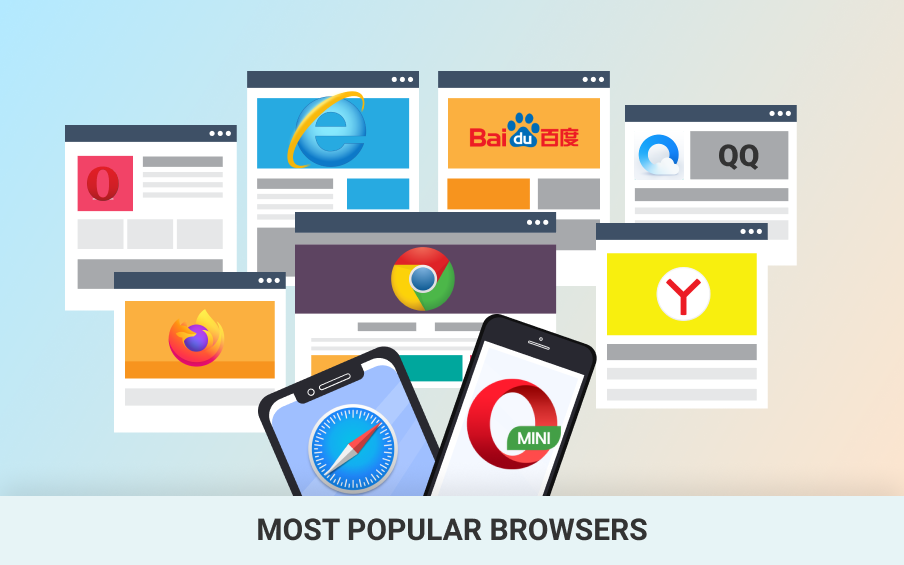
When you buy a new laptop or PC, you most likely begin your online journey with Internet Explorer or Microsoft Edge. In the case of mobile gadgets, Safari serves as the browser for iOS and Google Chrome serves Android.
Happily, you are not obligated to stick with the browser that came with your device. App stores offer a plethora of free and easy-downloadable programs. You can choose from numerous options and utilize the one that best suits your habits and preferences. It will take just a couple of minutes to install your new browser and start enjoying its benefits.
Following on the heels of our article about the top 10 search engines, the Clever team has prepared a list of the most popular web browsers for both desktop and mobile devices. Guided by Netmarketshare statistics, we selected 15 commonly used browsers and analyzed fluctuations in their popularity from 2016 to 2019.
Most Popular Internet Browsers for Desktop Devices
1. Google Chrome
Chrome was launched by Google in 2008, and was initially designed for Microsoft Windows. It was later adapted to other desktop and mobile platforms. It serves as a key component and platform for web applications in Chrome OS.
As of 2019, 67.33% of desktop device users prefer Google Chrome, compared to 59.13% in 2016. As you can see, the browser has grown in popularity, which has pushed it to the top of our list of popular browsers.
2. Mozilla Firefox
The Firefoх web app, originally named Phoenix, was launched in 2002, The developers strived to satisfy users’ needs by providing a full-fledged browser instead of a set of Mozilla applications.
Modern modifications of Firefox can be used on Windows (no older than the 7th version), macOS, and Linux. Also, you can leverage it on Android and iOS. Due to the platform’s peculiarities, the
WebKit layout engine is applied for iOS, while Gecko is used for all other cases. In 2017, new Quantum technology was deployed to improve usability, and make the interface of Firefox more appealing and responsive.
In 2019, 9.13% of desktop device users prefer Firefox, compared to 14.56% at the end of 2016. The browser has lost traction, but it still retains second place in our ranking of the most common browsers.
3. Internet Explorer
Developed in 1995, Explorer is a webspace veteran. Initially, it was embedded in Windows and provided as an add-on package. Later, users were allowed to download it for free or extract it from service packs. In 2003, Explorer enjoyed its peak success as the most popular browser, accommodating 95% of users.
In 2019, 7.49% of desktop device users prefer Internet Explorer, compared to 14.02% in 2016. The browser has clearly lost its sparkle, but it still holds third place in our ranking.
4. Microsoft Edge
Edge is a Microsoft product that symbolically follows its predecessor in ranking. The first 2015 version became available in Windows 10 and Xbox One. A mobile app (Android and iOS) was released in 2017. Since 2019, macOS users also can take advantage of Edge.
In contrast to Explorer, Edge is integrated with the latest extensions and does not support obsolete technologies. It initially used EdgeHTML and Chakra engines by Microsoft. However, in 2019 the Blink and V8 engines were used to turn it into a Chromium-based browser.
As of 2019, 5.56% of desktop device users prefer Edge, compared to 3.27% at the end of 2016. Edge appears to be strengthening its position and now holds fourth place in our ranking.
5. Safari
The first desktop version of Safari was designed for Mac OS X Panther and released by Apple in 2003. In 2007, following the release of the first iPhone, Apple created a mobile version for iOS.
Today, all Apple products have Safari as a default browser. A Windows-complaint version was introduced in 2007, but it was shut down in 2012.
As of 2019, 3.79% of desktop device users prefer Safari, compared to 3.03% at the end of 2016. Safari has edged up only slightly, and earns fifth place in our ranking.
6. Sogou Explorer
Sogou Explorer is a free Chromium-based product that uses WebKit and Trident engines by Chrome and Explorer respectively. The browser was first released in 2008. Today, it is especially popular in China.
As of 2019, 1.56% of desktop device users prefer Sogou, compared to 1.32% at the end of 2016. Sogou has strengthened its position enough to move up from 7th to 6th place in our ranking.
7. Opera
Opera is a product of Opera Software. It is suitable for all the most commonly used operating systems, underpinned by Chromium codebase and the Blink layout engine. Its main advantages include unique features and a user-friendly interface.
Opera’s key functionality was developed in 1994 within the framework of a research project by the Telenor telecommunications company and bought by its current owners in 1995. During its first decade, Opera was mainly positioned as a product for tech geeks and used its own Presto layout engine. Although this engine received many accolades in the tech community, it was replaced by Chromium in 2013
As of 2019, 1.51% of desktop device users prefer Opera, compared to 1.50% in 2016. Despite the slight increase in the number of users, the browser dropped from 6th to 7th position in our ranking.
8. QQ
QQ is a nontrivial product by Chinese company Tencent Internet. It is available to those using Android, Windows, Mac and iOS operating systems. Compared to traditional built-in browsers, QQ has superior functionality. You can use tabbed windows or connect external chat platforms to the browser. Release 9.0 was the first to use Chromium, replacing Trident as its codebase.
As of 2019, 1.45% of desktop device users prefer QQ compared to 0.83% at the end of 2016. Despite the increase in the number of QQ users, the browser remains 8th in our ranking.
9. Yandex
Yandex is a free product from Russia. It is underpinned by Chromium source code, the Blink engine, a proprietary security system, and Kaspersky scanning downloaded files for viruses, with Opera Turbo speeding up page loading.
In 2019, 0.88% of desktop device users prefer Yandex versus 0.3% in 2016. The number of users has significantly increased, and the browser has ascended from 11th to 9th place in our ranking.
10. UC Browser
UC Browser is a mobile browser developed by the Chinese company UCWeb, formerly known as UC Mobile. UC is so popular in large Asian markets that it even outstrips Google Chrome.
The product was first launched in April 2004 and made available for devices hosted on the Java platform. In 2010, the first iOS-compliant version was released and submitted to the App Store. In 2014, UCWeb was bought by the Alibaba Group.
Currently, UC Browser can be installed on all major mobile platforms, including Android, iOS, Windows Phone, Symbian, Java, Blackberry, as well as Windows desktop versions (starting from 2015).
As of 2019, 0.37% of desktop device users prefer UC compared to 0.52% at the end of 2016. The decreased number of users has knocked the browser down from 9th to 10th position in ranking.
11. Baidu
Baidu is a web browser created by an eponymous Chinese company. Windows and Android users can attain and exploit it for free. The first version was released in beta format in 2011. Many users noticed that Baidu had much in common with Google Chrome and Chromium.
In 2019, 0.27% of desktop device users prefer Baidu versus 0.25% in 2016. The number of users has slightly increased, helping the browser ascend from 12th to 11th position.
12. Maxthon
This product was initially known as MyIE2. It is a free web application for Windows and OS X, created by the Chinese brand Maxthon and positioned as an add-on for Internet Explorer.
The mobile app can be utilized on iOS, Android, and Windows Phone. Since its third release, Maxthon allows users to opt for Trident or WebKit.
Maxthon has two times won the CNET WebWare 100 Awards, and it was included in PCWorld magazine’s 2011 best products list.
As of 2019, 0.20% of desktop device users prefer Maxthon. Compared to 0.32% at the end of 2016. The number of users has decreased, causing the browser to plummet from 10th to 12th place in our ranking.
13. Chromium
This is a free product offered by Google, and a significant part of its source code is used by Chrome. Since chromium is the metal used to make chrome plating, it is clear from the product names that one browser was used as a building block for the other. Third-party companies can also benefit from Chromium’s advanced open-source code by creating their own browsers.
Fans of minimalism will like Chromium’s interface. Developers have showcased only the most important features to avoid clogging up space and to ensure superior speed.
As of 2019, 0.11% of desktop device users prefer Chromium compared to less than 0.01% in 2016. The browser is gradually strengthening its position, boosting it from 15th to 13th place in our list.
14. Vivaldi
Vivaldi is a relatively young product that can be used on multiple platforms, free of charge. It was launched in 2016 by Vivaldi Technologies, and the mobile version was released in 2019.
Although everyone can take advantage of Vivaldi, tech geeks make up a significant portion of its audience. Many were discouraged by Opera’s migration from Presto to Chromium and sought their favorite features in Vivaldi. Yes, this browser is also Chromium-based, but the developers have done their best to preserve the spirit of tech and revive the functionality lost by Opera.
As of 2019, 0.10% of desktop device users prefer Vivaldi, versus0.04 % in 2016. Despite the browser’s growing popularity, it remains 14th in line.
15. Amigo
This product was created by Mail.Ru Group using Chromium code and designed mainly for accessing social networks via a special built-in panel.
The first web app was released in 2011 and named Internet@Mail.ru. In 2012, it was renamed Amigo and got a new logo. Since 2013, only XP or newer Windows versions have supported it. A bit later, the app was tailored to Android.
The project is currently closed. Developers have promised that the termination of Amigo will do no harm to existing versions, and it will be possible to continue using them.
However, the popularity of Amigo had decreased anyway, with only 0.03% of desktop device users preferring it in 2019, compared to 0.08% in 2016. Amigo dropped from 13th position to the final 15th position in our ranking.
Most Popular Internet Browsers for Mobile Devices
1. Google Chrome
The Chrome app tops the list of programs most commonly used for mobile browsing. In 2019, 64.30% of mobile phone owners prefer it compared to 55.63% in 2016. The browser continues to strengthen its position in the mobile arena, just like the desktop version.
2. Safari
Safari holds second place in the mobile browsing list, making it more successful than in its desktop ranking. In 2019, 27.10% of mobile phone owners use Safari compared to 24.48% in 2016, strengthening the browser’s position.
3. QQ
QQ is among the top three most popular mobile browsers, which makes its mobile version much more successful than its desktop version. In 2019, 1.78% of mobile devices use QQ versus 0.76% in 2016. The browser has significantly strengthened its position and ascended from 6th to 3rd position.
4. Android AOSP Browser
Prior to the release of Google Chrome’s mobile version, AOSP was used as a standard Android browser. While it lacks sophisticated design, it takes up a minimum of space, requires few resources and works quickly. All features are straightforward and the interface is responsive, making AOSP extremely user-friendly and easy to navigate.
Despite its advantages, AOSP is losing ground. In 2019, 1.49% of mobile devices use it, compared to 5.72% at the end of 2016. Notwithstanding a significant decline in popularity, the browser still ranks 4th in our list.
5. UC Browser
Since UC Browser was originally designed for mobile use, it is not at all surprising to see it among the five most popular browsers for mobile devices.
In 2019, 1.27% of mobile phone owners use UC compared to 5.69% in 2016. Despite a significant loss in user interest, the browser retains 5th position in the ranking.
6. Baidu
Baidu’s mobile version is much better situated than its desktop version.
In 2019, 1.25% of mobile devices use this browser compared to 0.3% in 2016. Consequently, Baidu had swiftly ascended from 10th to 6th position in our ranking.
7. Mozilla Firefox
The mobile version of Firefox is not as popular as the desktop one. In 2019, 1.02% of mobile devices use it, compared to 0.57% in 2016. The browser has not only retained 7th place in the ranking but has also strengthened its position.
8. Opera Mini
Initially, Opera Mini, which has much in common with Opera Mobile, was available on Windows 10 Mobile, Windows Phone 8.1, BlackBerry, Symbian, and Bada. The latest versions were tailored specifically to Android and iOS. Earlier modifications tailored to other operating platforms can still be used, even though their development has been suspended.
Compression through Opera Software’s proxy server is one of the key advantages of this browser. Reducing file size by 90% ensures a speed increase of 2 to 3 times. Even non-mobile-optimized pages are uploaded without delays, greatly improving user experience. The only thing Opera Mini cannot yet cope with is interactive pages underpinned by JavaScript. Hopefully the developers will soon find ways to properly process such content.
In 2019, 0.91% of mobile devices use Opera Mini versus 5.81 in 2016. The number of users has significantly decreased, dropping the browser from 3rd to 8th place in the ranking.
9. Opera
The mobile version of Opera is in the same situation as the desktop version. Despite a slight increase in the number of users, the browser fell from 8th to 9th place, with 0.41% of mobile devices using Opera Mobile in 2019 versus 0.39% at the end of 2016.
10. Yandex
Although the mobile version of Yandex does not hold one of the top positions in the ranking, it joins the desktop version in swiftly gaining popularity. In 2019, 0.22% of mobile phone owners use Yandex, an impressive leap from 0.07% of users in 2016. The browser significantly strengthened its position and ascended from 12th to 10th position.
11. Sogou Explorer
The mobile version of Sogou is less popular than its desktop version. In 2019, 0.14% of mobile phone owners use this browser compared to 0.03% at the end of 2016. The browser has strengthened its position and climbed from 13th to 11th position.
12. Microsoft Edge
The mobile version of Microsoft Edge is not as popular as its desktop version. In 2019, 0.04% of mobile devices use it, compared to 0.33% in 2016. The browser has dropped from 9th to 12th position in ranking.
13. Samsung Browser
This browser was designed for Samsung devices, based on Chromium technology. It is installed by default on all Galaxy devices. Since 2015, it has been available in Google Play.
Most alterations to the original Chromium codebase have been introduced with the aim of supporting Samsung’s exclusive hardware, such as Gear VR and biometric sensors.
At the end of 2016, the app was used by less than 0.01% of mobile phone owners, rising to 0.03% in 2019. The browser is gradually strengthening its position, rising over the last three years from 15th to 13th position.
14. Internet Explorer Mobile
Explorer’s mobile app is not as popular as the desktop version. In 2019, 0.01% of users prefer it, compared to 0.16% in 2016. The browser has nosedived from 11th to 14th position.
15. Dolphin
Dolphin is a proprietary product launched by MoboTap Inc. in 2009. Dolphin was designed for Android and iOS, and distributed for free. It uses WebKit engine and supports advanced extensions and gesture control.
In 2019, less than 0.01% of users prefer Dolphin. In 2016, Dolphin had a firm share of 0,01%. It seems that the already unpopular browser has entirely lost ground. But who knows, anything can change in the future.
Most Popular Desktop Browsers (2016)
Most Popular Desktop Browsers (2019)
Most Popular Mobile Browsers (2016)
Most Popular Mobile Browsers (2019)
Final Thoughts
We hope our research will help you choose the most suitable browser for your desktop and mobile devices. The Clever team diligently monitors tech trends, and we do our best to deliver the latest and most relevant information to you, via our blog. Stay tuned!















































